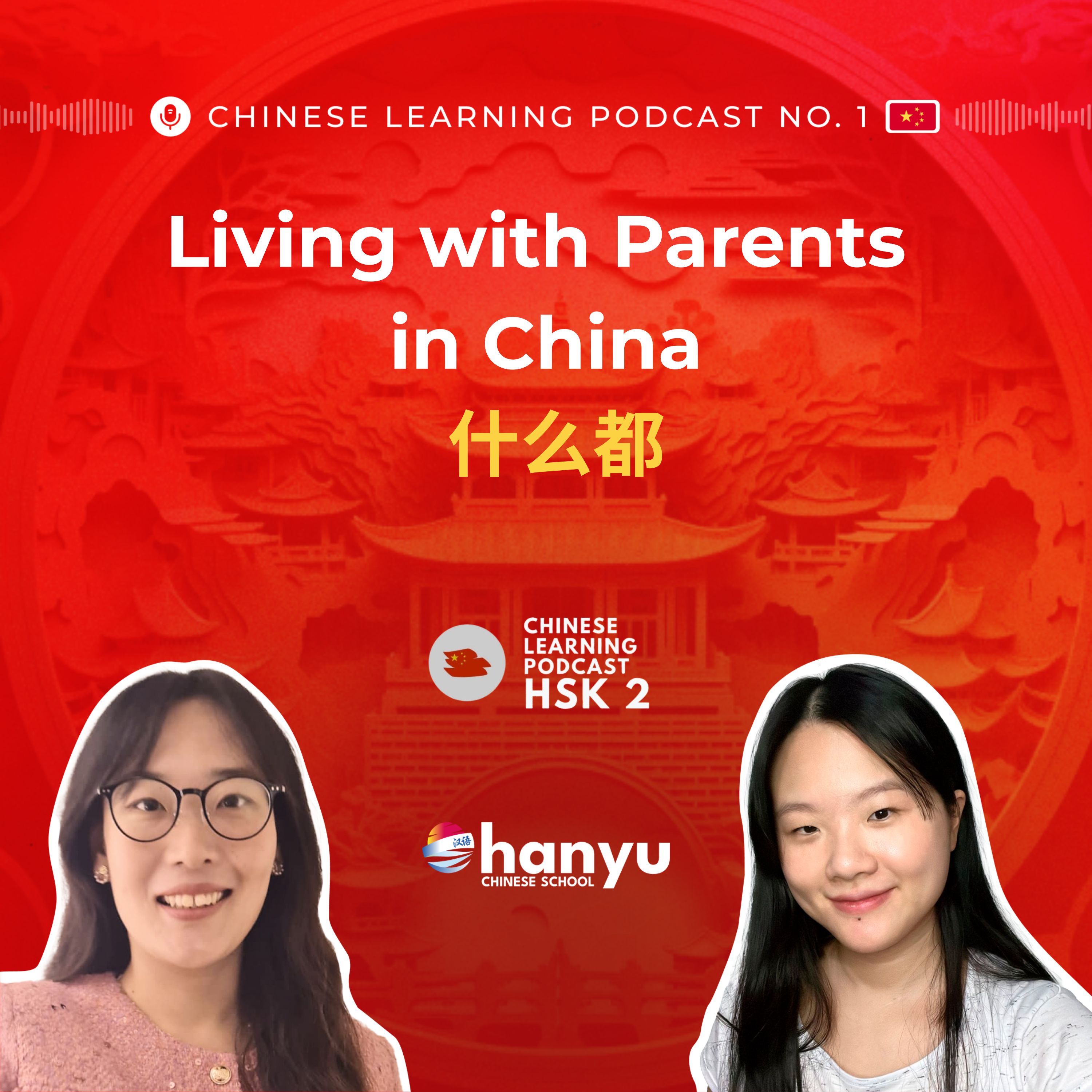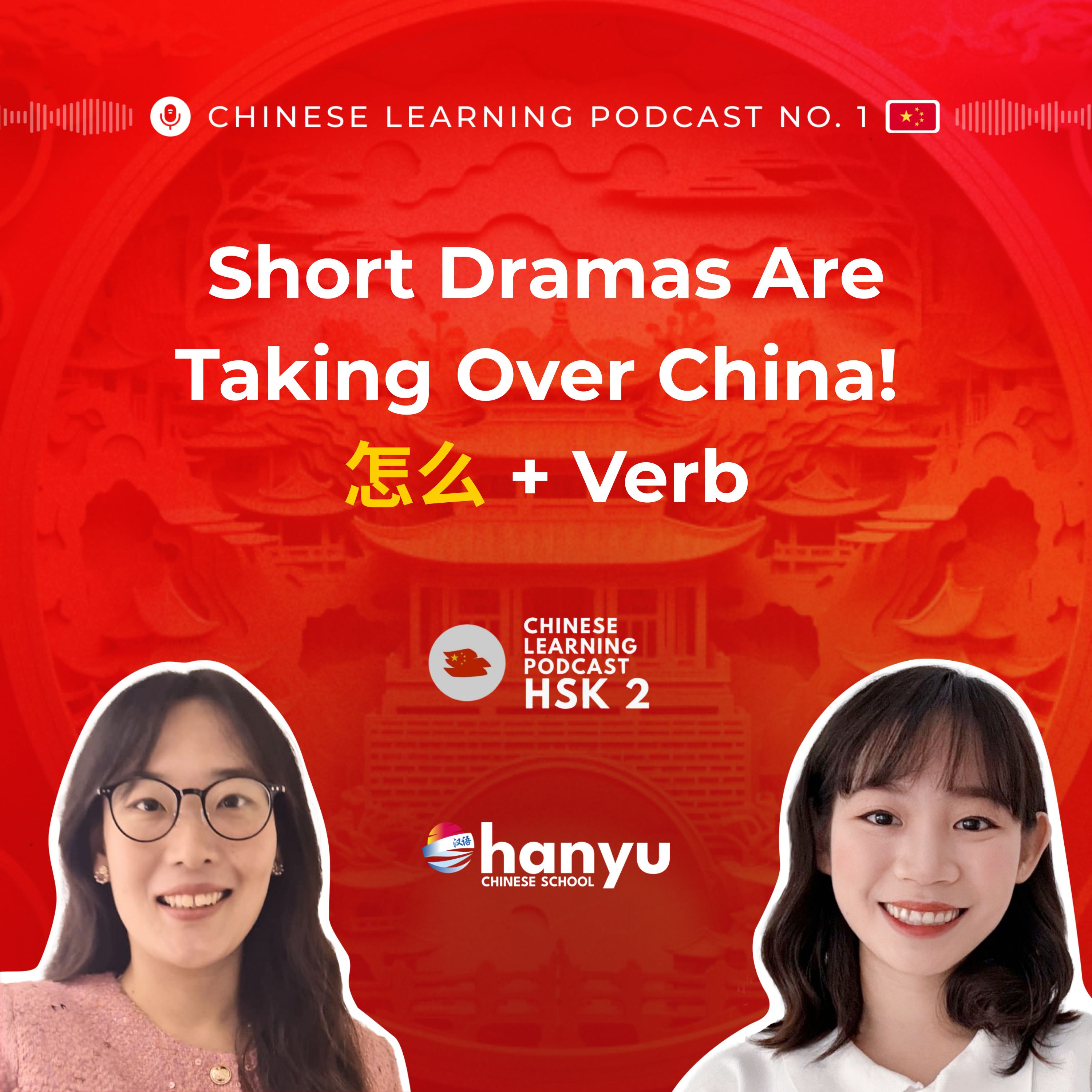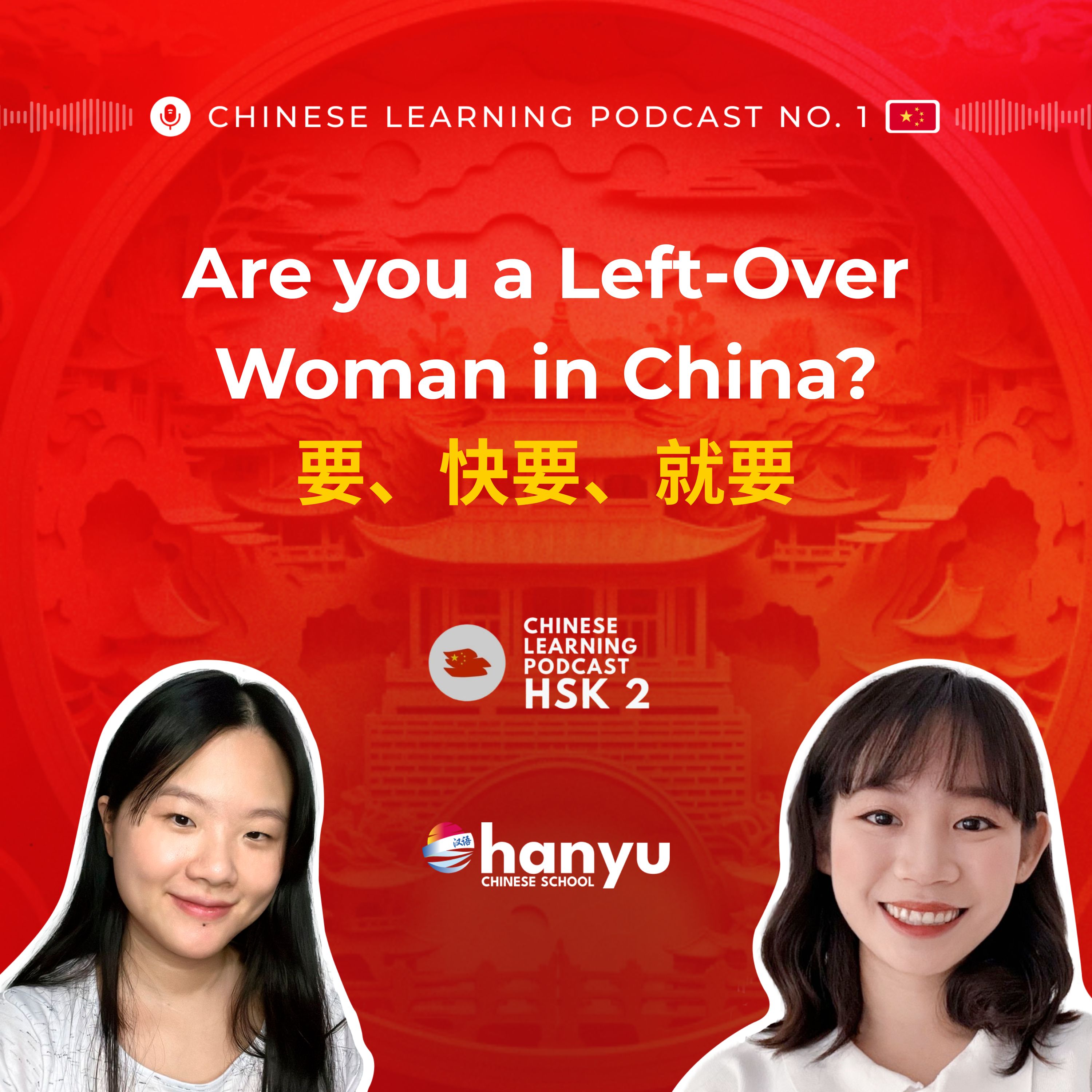Episode Transcript
[00:00:00] Speaker A: Foreign.
Hello, everyone.
Welcome back to our HSK2 Chinese podcast. I'm Melanie, your old friend, and I'm here with my amazing co host, our old friend, Emily.
[00:00:26] Speaker B: Hi, everyone.
So today we are going to learn something different. We're gonna learn something about comparing things in Chinese. We're gonna learn about.
So you will hear them everywhere in the everyday conversation.
[00:00:52] Speaker A: Yes, that's right. So.
And will help you say things like more than or less than or even not as good as, for example, I'm taller than you.
I eat faster than you. So if you're talking about how much taller you are than your friend or how much faster you eat, we've got you covered today.
[00:01:27] Speaker B: And we're gonna make it easy for you to use these in real conversations.
Also, we will be exploring how these things play a huge part in Chinese culture. And also we are gonna talk about the drinks in China.
So people might wonder why we always have hot water or hot tea.
So stick with us till the end.
[00:01:52] Speaker A: Sounds interesting. So let's dive in and have some fun with comparisons in Chinese.
[00:02:00] Speaker B: Very good. So before we start, you are listening to the Hanyu Chinese podcast. So if you are learning Chinese and want to take your skill to the next level, you are on the right place.
So we are going to show you in this episode, you're gonna see a lot how we teach and how we do things together in the classes as well.
So if you'd like to learn with us and try a free one on one class through our platform, we have courses starting from €39 with live classes, recorded classes, and full access to our online platform. So you can learn at your own pace. So visit our website here. Down here hanyechineschool.com and choose your path.
[00:02:51] Speaker A: Okay, so we will start with our dialogue.
So the setting of this dialogue is Melanie and Emmeline are discussing their basketball skills. Skills and comparing each other's performance.
Actually, I'm not very good at playing basketball.
[00:03:13] Speaker B: Me neither. Me neither.
[00:03:16] Speaker A: I'll pretend to be an expert.
[00:03:20] Speaker B: Let's see, let's see.
[00:03:21] Speaker A: Okay, let's start it.
So kalai nishatsuya.
Okay.
[00:04:16] Speaker B: How say like we saw in the dialogue, talk about our comprehension. So using B for comprehension more than compared to. So the structure is a B, B and then your adjective. So this structure is used to compare two things and express that one is more than or better than the other.
So you have to use the. You have to put the one you want to use it as the better one in the front.
[00:04:56] Speaker A: Okay, so let's see Some examples. Example, first example, my older brother is taller than me.
Here is used to compare height. And the gao means tall.
And second example, this car is faster than that car.
Here is used to compare the speed of two cars. Huai means fast.
[00:05:31] Speaker B: Very good.
So what's the second one we're going to talk about is.
So we change the B to me, so that means not as blah blah, blah as something or A less than.
So the structure is to express that A is not as. Not as good, not as tall, not as whatever kind of adjective you want to put it here as B. It is used when comparing two things in terms of specific quality. And A is less than that of B.
[00:06:09] Speaker A: Yes.
So let's see more examples.
First, I'm very humble. I'm not as smart as her. So mei here is used to express that I'm less intelligent than she is. And the second example.
[00:06:34] Speaker B: The weather today.
[00:06:35] Speaker A: Is not as cold as yesterday.
The temperature of today with that of yesterday.
[00:06:44] Speaker B: Very good.
So then we can use these two like what we have learned. So we can combine bi and meo in one sentence.
So let's take a look here. The first one is so I run faster than you, but I do not run as fast as him.
Very good.
[00:07:20] Speaker A: Okay.
[00:07:20] Speaker B: Okay.
[00:07:23] Speaker A: You want to explain more?
[00:07:25] Speaker B: Ah, no, it's fine. It's fine. I did.
[00:07:27] Speaker A: Okay, so my turn though. So the second example is.
Okay, so here we got the Li. We have talked about this in previous episodes. So if you don't remember it or if you don't know it, please watch previous episodes. So here my house is very close to school, but my house is not as close as yours. So here compares distance between two houses, and the male expresses the difference in closeness.
And we got another example.
This apple is sweeter than that one, but is not as big as that one. So B here shows the comparison in sweetness. And Mayo compares the size.
[00:08:31] Speaker B: Very good.
So overall, overall, the key takeaways are that B is usual comprehension, meaning more than, and male is less than. So not as good or not as adjective as something.
So you can combine both B and male to create a more complex comprehension. So remember, the thing that you want to use that is more, you put it in the front.
[00:09:05] Speaker A: Very good.
Okay, now it's your turn.
Let's see how well you've understood and the Mei. So how would you say this book is more interesting than that one? But that book is not as expensive as this one in Chinese.
[00:09:29] Speaker B: So go ahead and try it out in the comment section down below. Take your time to Write it down and don't hesitate to ask us any question.
[00:09:38] Speaker A: If you are unsure, we'll be looking at your answers and helping you out. So make sure to give it a go.
[00:09:49] Speaker B: Very good.
So let's take a look about the lesson. Review what we have talked about.
[00:09:59] Speaker A: Yeah. So please pay attention to the grammar points we have talked about in this episode and are for comparative sentence.
So I'll start.
How are you at basketball?
[00:10:26] Speaker B: I'm not bad at basketball, but my friend is better than me.
[00:10:36] Speaker A: Oh, really?
Oh, oh really?
Who won when you played against each other?
[00:11:04] Speaker B: Of course my friend won. She's taller and faster than I am.
[00:11:16] Speaker A: Looks like you need to practice more next time.
[00:11:32] Speaker B: Yeah. After all, I don't have as much basketball experience as she does, so I need to work harder.
[00:11:42] Speaker A: Thank you. So, all right.
Did you notice the grammar we have talked about?
Okay. So are you enjoying this episode? With our classes, you can make even more progress.
We are the top rated online academy with over 3,000 satisfied students. And we have an overall rating on Trustpilot 4.8 out of 5 based on over 200 reviews. We offer courses starting from just €39, including group classes, recordings and a 24.7learning platform.
And if you'd like to start step by step, try a free class and see for yourself.
Find everything at our website.
[00:12:33] Speaker B: And you.
[00:12:33] Speaker A: Can also scan the QR code right here at this page.
Or you can also listen to all our podcast episodes. On our campus, we have our podcast on all kinds of platforms. Spotify, YouTube, Twitch, Apple Podcasts, etc. If you want to know more can check on our website.
Oops.
Okay, very good.
Let's move on to our cultural segment.
So what we're gonna talk about today's Chinese culture.
So you might find this topic really interesting.
Sometimes it shocks Chinese learners, foreigners. Because in China, there's a strong belief in the health benefits of drinking hot water or hot tea.
And it's something many Chinese people do daily. But did you know that this is d deeply rooted in traditional Chinese medicine?
[00:13:47] Speaker B: Yes.
So we have look in about Chinese medicine before now hot water, it's also considered to be beneficial for your body because it helps you with digestion and maintains the body's balance. Especially the terms of it believes that cold water, like ice water, can accept the body's balance, causing health issues. So it's quite common to see people always drinking warm or hot water throughout the days.
[00:14:20] Speaker A: That's right.
And let's not forget about tea cha. In China, hot tea isn't just a beverage. It's a social, cultural experience.
From green tea lucha to Wu long tea, Wu long chaos, it's an essential part of Chinese culture. Drinking tea is also seen as a way to detoxify the body.
[00:14:49] Speaker B: And so another interesting thing is that for the woman tails. So when we are having our regular, it is actually not good to drink or eat anything that is with ice.
No ice cream, no ice, cocoa, no ice water, nothing with ice. Actually just nothing with ice.
Even some kind of fruit that is considered cold, you're not allowed to have it.
[00:15:26] Speaker A: Yes.
So this practice is tied to the belief that cold can disrupt the flow of qi, which means energy, and lead to health problems like stomach issues or painful periods. So that's why you might hear someone say, so you shouldn't eat ice during your period.
[00:15:54] Speaker B: Yes.
So other than the perspective from what we said about your energy and the qi or yinyang, other than that, that is more about the traditional aspect. But for nowadays, even like the younger people, right now, everyone, every Chinese know about not to eat something ice. It's not that good for your body. Like, overall, for us, we just think that drinking something warm or hot is healthier. Right?
[00:16:28] Speaker A: Exactly. So, you know, Chinese people, we care so much about our body. Health is really important.
Okay, so if you ever travel to China, don't be surprised if someone offers you hot tea or hot water. Just hot water. Roshui, without tea, instead of ice water or ice drinks, it's all about keeping the body warm and in balance. So even in some Chinese restaurants, you can only have hot water. So don't wait for cold beverage. If you need some, order some.
[00:17:09] Speaker B: Yeah, exactly. Even if you say like you want tap water, I think they will normally give you a warm water. They won't give you like a really icy one.
It just doesn't exist here in Asia. I would say.
[00:17:27] Speaker A: It sounds strange, right? So I remember there is a Chinese learner, and he's French, and he was invited to a Chinese friend's house. And this Chinese person gave him a cup of hot water and he didn't drink it. And another friend asks him, why don't you drink? And he answered, oh, I'm waiting for my tea.
[00:17:53] Speaker B: Oh, oh, oh. He thought that wasn't his.
[00:17:57] Speaker A: Yeah, so but please drink it. Even hot water is the beverage we. Yeah, we offer forever.
[00:18:05] Speaker B: I remember the funny thing for me is when I first study abroad, I met some. Some girls from Europe.
And that, like, I remember that week was me having a period.
And I was like, I was having like a little stomach or something. And Then they're like, oh, do you want to eat something or something, like ice cream or something? I'm like, I'm like, no, I'm on my period.
Because in China when you say, like, I'm on my period, they would immediately understand. Like everyone, including boys and girls, they would understand immediately that you shouldn't eat something icy.
And so I said, immediately, no, I'm on my period. And they were like, so you want ice cream?
What? I'm on my period. Did you not hurt me? And they're like, yeah, so and so. And then like afterwards I understood like, oh, this is something from Chinese medicine. I didn't know that because growing up I was taught like, you shouldn't have something cold when you're having a period. So I didn't even thought about that. Was Chinese medicine related?
[00:19:15] Speaker A: Yeah, they didn't get it yet. Right. Because it's totally different culture.
[00:19:21] Speaker B: Yeah, exactly. So just to be careful when you're. If you are having a Chinese friend, just keep it in mind that they don't eat something too icy.
[00:19:33] Speaker A: Yeah. Please give them hot water or hot tea.
Exactly.
Okay, let's go back to the question we asked earlier.
So how would you say this book is more interesting than that one? But that book is not as expensive as this one in Chinese.
[00:19:55] Speaker B: So the correct answer we have here.
[00:19:58] Speaker A: Is well done if you got that right.
If not, don't worry. Just keep practicing and you will get that correctly.
Very well.
[00:20:19] Speaker B: So next one is now your turn to practice using be to make a sentence. For example, you could say, my house is very close to the supermarket, but not as close as going to the school, something like that. Or so you can use or me or whatever grammar that we learned today.
[00:20:45] Speaker A: Good ideas.
So please drop your answers in the comments below. We can't wait to see how you use in your sentences. Go ahead and give it a try.
[00:20:56] Speaker B: She said, very good.
So thank you for staying us until the end. If you truly want to learn Chinese and with real teachers, with real native teacher and with the clear method. So please Visit our website kanyechineschool.com and book your first free class.
We have courses starting from €39, live classes, recordings and completely complete platform to help you with your progress step by step.
So you can also scan the QR code right here to take a look. Plus all of our podcasts are organized in the campus so you can track your progress also down in our here in our website.
So see you in class. Hope you see you.
[00:21:48] Speaker A: Okay, so today what we have learned, we covered bi and mei for making comparison. Do you still remember?
And we also discussed the fascinating Chinese cultural beliefs around hot water and ice bean during menstruation.
[00:22:17] Speaker B: So the next episode we will be exploring the word, which is also used to talk about times or occasions. You will learn how to say things like I have been there three times. This is my second time studying in China.
Something like this. So you won't want to miss it.
[00:22:39] Speaker A: So make sure to subscribe to the podcast and share it with your friends or family members who are also learning Chinese. And stay tuned for the next episode. If you want to practice with native Chinese teachers, don't forget to head over to our website, hanyuchineschool.com and book your free trial class today.
[00:23:02] Speaker B: Thank you for listening and we'll see you in the next episode.
[00:23:07] Speaker A: See you next time. That.


